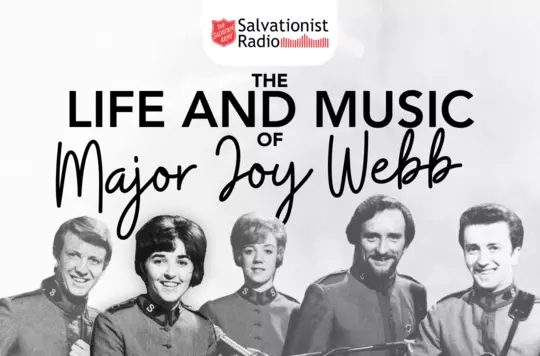18 November 2023
How hard is it to make a lasting difference?
Captain Tim Swansbury
Captain Tim Swansbury asks if the impact of our lives is significant or fleeting.
Key text
Have you ever heard someone use the phrase: ‘If it is the Lord’s will, we will…’? As a child, I used to be fascinated when my Grandma Lilian regularly said this. It spoke to me of such reverence for God and true humility. When speaking about the future, I don’t use this expression often. Nevertheless, this saying from James 4:15 helps us remember God’s sovereignty. He is in control of our lives and of everything, and we should be careful not to arrogantly make plans apart from him and certainly not boast and brag, as ‘all such boasting is evil’ (v16).
Beginning with ‘now listen’ (v13), James grabs our attention before asking us the most fundamental of questions: ‘What is your life?’ (v14). He drives his point home as he gives us his answer: ‘You are a mist that appears for a little while and then vanishes.’ Such a statement seems to fly in the face of the popular, perpetual narrative of the day that states ‘you’re worth it’ and ‘you’re amazing’ – attempting to address the evident mental health challenges of our day and age.
The Bible, however, teaches that we are both insignificant and significant. So, the job of a mature disciple is to know how to hold the truth of both these realities in perspective and to know when to be humble. The psalmist says: ‘The life of mortals is like grass, they flourish like a flower of the field; the wind blows over it and it is gone, and its place remembers it no more’ (Psalm 103:15 and 16). We also recognise our immense and immeasurable worth to God when we read: ‘You have made [humankind] a little lower than the angels and crowned them with glory and honour’ (Psalm 8:5).
Reflect and respond
- Look at ‘Who I am in Christ’, a page of Bible verses on the Freedom in Christ website.
- Are we more often prone to feeling insignificant and in need of lifting up, or do we more often need to practise humility?
- If every breath we receive is in God’s almighty hands, are we in submission to his will for us?
Our study passage follows James’s earlier call to: ‘Submit yourselves, then, to God’ (James 4:7). James is specific as to how we are to do this, being careful not to ‘boast and brag’ is one such example. James’s next example and strongest warning is found in chapter 5, beginning with ‘now listen’ as he addresses ‘you rich people’ (v1). Who is James talking to here? Might he be talking to you and to me?
Our natural reaction, as we compare ourselves to others, is to decide that James is not talking to us. ‘I’m not rich,’ we conclude. However, it is sobering to realise that, taking the average UK household income, we are richer than 90 per cent of the global population; our income is more than seven times the global average. We would like to let ourselves off the hook, but James and the Holy Spirit through this letter are definitely speaking to rich people like you and me.
While some use their wealth to practise the ‘true religion’ James speaks about in chapter 1, we have to admit that money can mean ‘selfindulgence’ (5:5) and can seriously distract us from the surrender, sacrifice and self-denial of being a follower of Jesus. While all the specifics of James 5:1–6 may not apply to us literally, do we remain open to hearing the conviction and challenge of the Holy Spirit? We need to allow him to show us where we might be doing something that oppresses or where we are not doing something that is necessary.
Although separate from this section addressed to rich people, the words of James 4:17 are actually very helpful at this point: ‘If anyone, then, knows the good they ought to do and doesn’t do it, it is sin for them.’ May we be as aware and concerned about the sins of omission – the good we don’t do but should, as well as the sins of commission – those things we do that we should not.
I get frustrated when one of our young children says: ‘I’m bored!’ So, I try to help them by opening them up to the unlimited number of positive things they could be engaged in, even if it’s only helping to lay the table.
Are we more often prone to sins of commission or sins of omission? In terms of sins of commission, perhaps we have been challenged around the area of money and how we use it. There might also be other areas of life that we have not yet submitted to God.
Pause and reflect
- Does your expenditure reflect your life as a disciple of Jesus?
- How could you use your time and/or money to bring about a positive impact to people around you?
We might choose to speak with a trusted friend about our finances and how they can be submitted to God. Perhaps we can discover ways in which we can be part of a solution in a broken world. Dare we continue or even start a conversation about other areas of our lives that need to be submitted to God?
Regarding sins of omission, might we perhaps be guilty of wasting lots of time on insignificant things?
Ask others or your corps officer for suggestions of things you could get involved in that would make a lasting difference for good in the lives of others, and also have a really positive impact on your own life.
As we read beyond the verses of this study passage, we discover more hopeful words from James. He reminds us that: ‘The Lord is full of compassion and mercy’ (James 5:11). That’s cause for rejoicing!
Bible study by

Captain Tim Swansbury
Corps Officer, Rotherham
Discover more

Celebrate the life and music of Major Joy Webb in this Salvationist Radio special.

Join Salvationists across the territory in worship, with music, prayer and a Bible message from a guest speaker.

Captain Kathryn Stowers talks to Major Jo Moir (THQ) about celebrating 150 years of mission and ministry in Wales.

